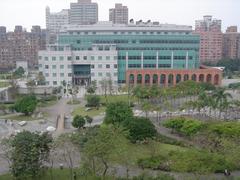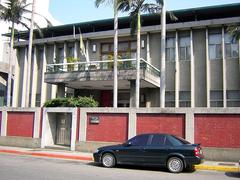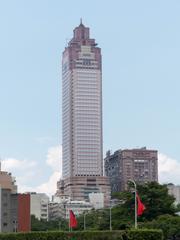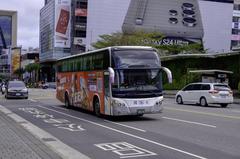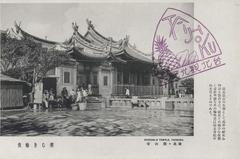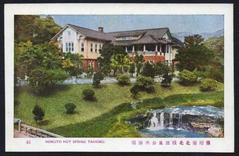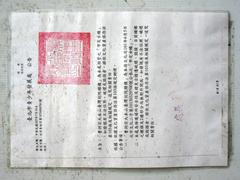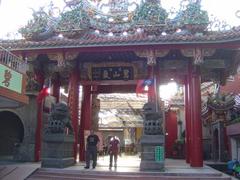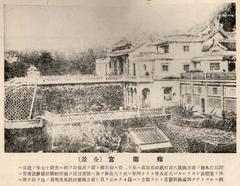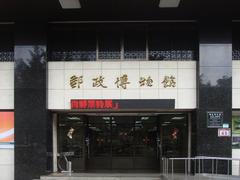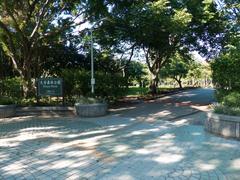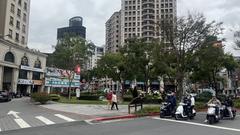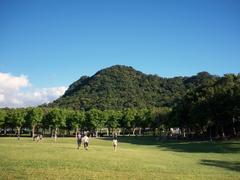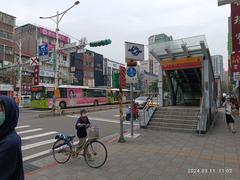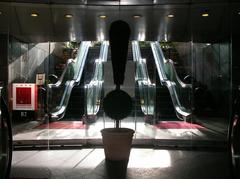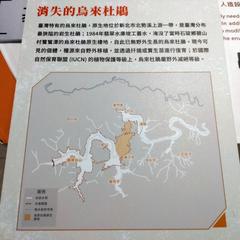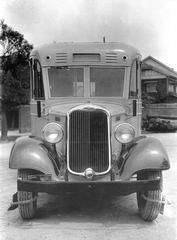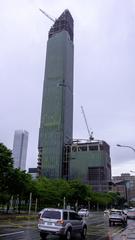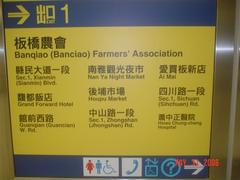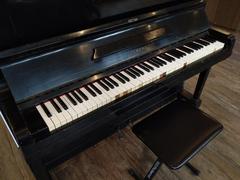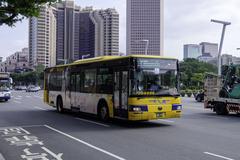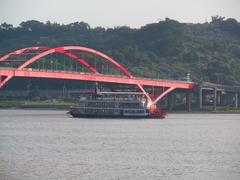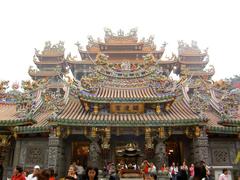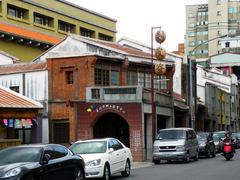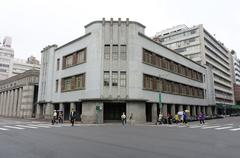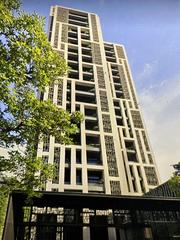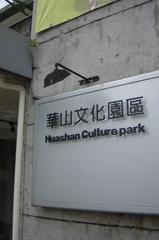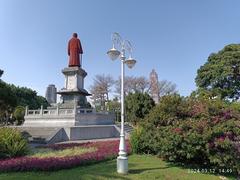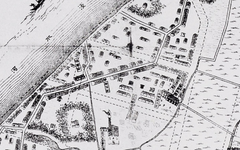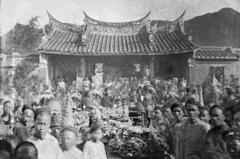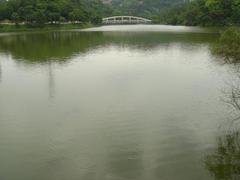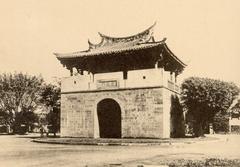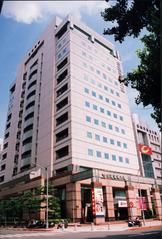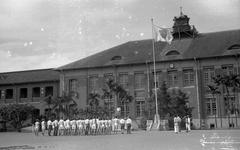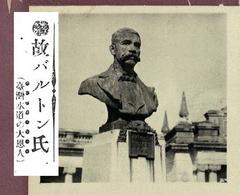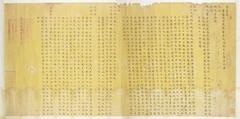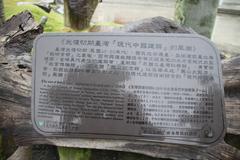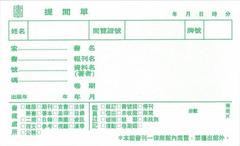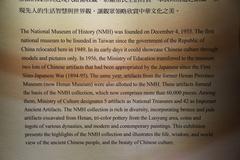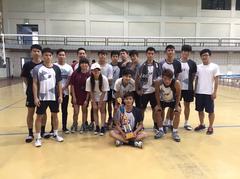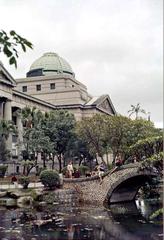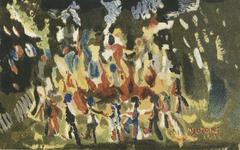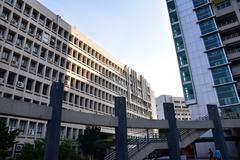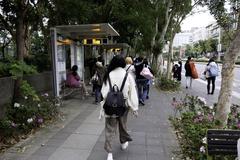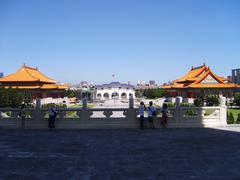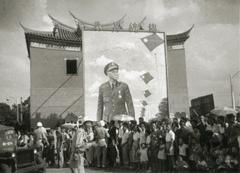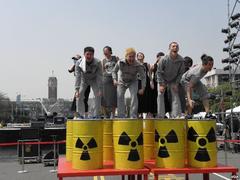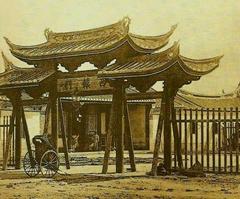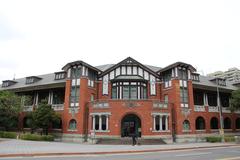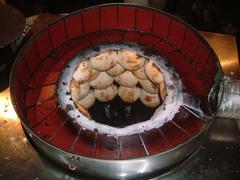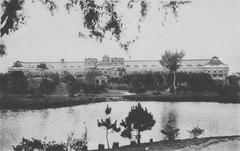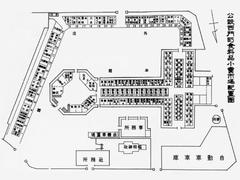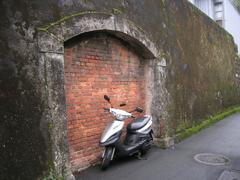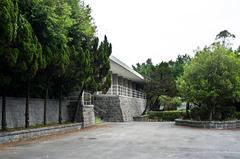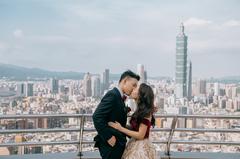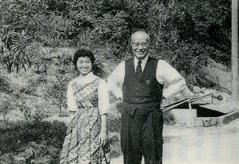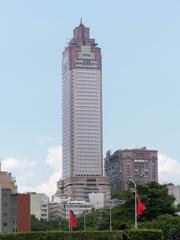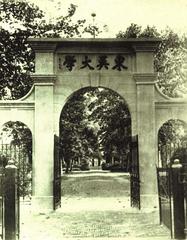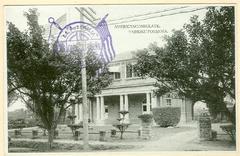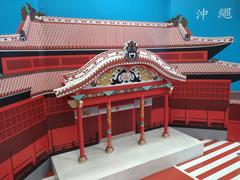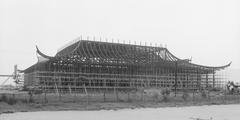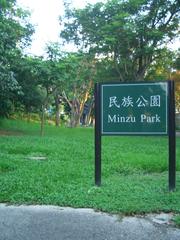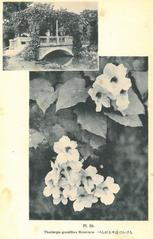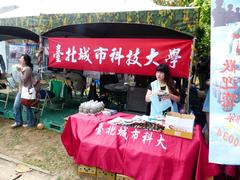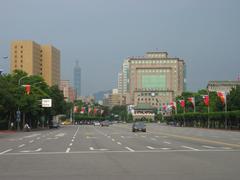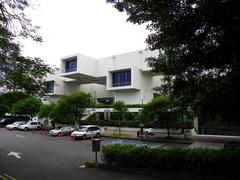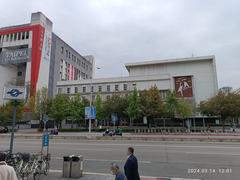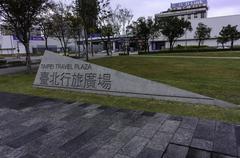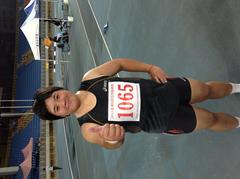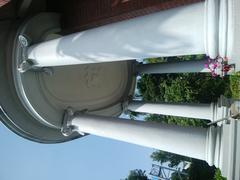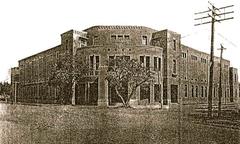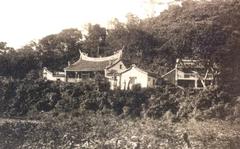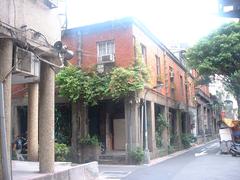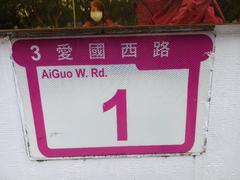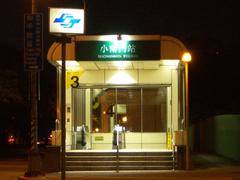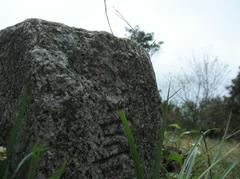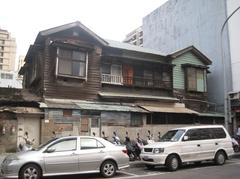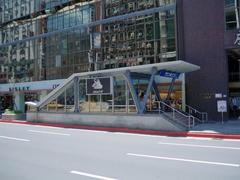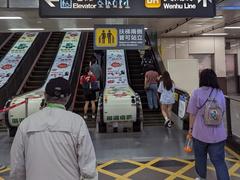Taipei Cultural Mosque Visiting Hours, Tickets, and Travel Guide
Date: 04/07/2025
Introduction
The Taipei Cultural Mosque, located in the bustling Zhongzheng District, is a prominent symbol of Taiwan’s religious and cultural diversity. Founded in 1950 by Akhond Hsiao, a visionary Muslim leader from northwest China, the mosque has grown from a humble residence into a multifaceted institution. It serves as both a spiritual sanctuary and a cultural hub, reflecting the resilience and integration of Islam within Taiwanese society (Wikipedia; Taiwan Halal; My Guide Taipei).
As Taiwan’s third mosque, the Taipei Cultural Mosque is architecturally unique, blending traditional Islamic motifs with modern urban design across its five stories. The mosque is not only a place of worship but also a center for education, interfaith dialogue, and halal certification through its partnerships with organizations like the Chinese Muslim Youth League and the Taiwan Halal Integrity Development Association.
Visitors are welcomed with thoughtfully provided information on etiquette, accessibility, and nearby attractions. The strategic location near landmarks such as the Chiang Kai-shek Memorial Hall and the National Taiwan Museum further enhances its appeal as a must-visit Taipei historical site.
To help you prepare for a rewarding visit, this guide details the mosque’s history, cultural significance, visitor information, and travel tips. For the latest schedules and audio tours, consult official resources and consider using the Audiala app.
Contents
- Early Foundations and Community Origins
- Relocation and Architectural Transformation
- Institutional Development and Community Role
- Renovations and Modernization
- Historical Significance and Cultural Impact
- Leadership and Community Dynamics
- Accessibility and Urban Context
- Visitor Information: Visiting Hours, Tickets, and Tips
- Nearby Attractions
- Key Milestones and Timeline
- Frequently Asked Questions (FAQ)
- Architecture and Facilities
- Muslim-Friendly Amenities
- Conclusion and Travel Advice
- References
Early Foundations and Community Origins
The Taipei Cultural Mosque was established in 1950 by Akhond Hsiao (Xiao Yongtai), a prominent Muslim leader and founder of the Chinese Muslim Youth League. Originally housed in Hsiao’s Japanese-style residence on Roosevelt Road, the mosque was a response to the influx of mainland Chinese Muslims after 1945, following the end of Japanese colonial rule (Wikipedia; Taiwan Halal).
The mosque’s establishment was closely linked to a mission of promoting Islamic faith through cultural engagement and educational initiatives. The Chinese Muslim Youth League, headquartered at the mosque, played a vital role in fostering community identity among new migrants.
Relocation and Architectural Transformation
Urban development in Taipei necessitated the mosque’s relocation when the original building was demolished for a road-widening project. The current site at No. 3, Lane 25, Section 1, Xinhai Road, Zhongzheng District, was selected, and a new five-story mosque, designed by architect Huang Mo-chun, was completed in 1983 (Wikipedia).
The structure combines traditional Islamic features—arched windows, geometric patterns, a mihrab, and minaret—with modern elements tailored for urban use. Each floor serves a specific function: prayer halls, classrooms, offices, and community spaces, reflecting the mosque’s evolving role as a religious and cultural institution.
Institutional Development and Community Role
From its inception, the Taipei Cultural Mosque has functioned as more than a place of worship. It serves as a headquarters for the Chinese Muslim Youth League, hosts religious classes and interfaith dialogues, and houses the Taiwan Halal Integrity Development Association (Taiwan Halal). These efforts have helped the mosque become a focal point for Muslims of diverse backgrounds, including recent immigrants and foreign workers from Southeast Asia.
Decline after Akhond Hsiao’s death in 1990 was reversed through support from the Indonesian Economic and Trade Office, which funded renovations and revitalized the mosque’s connection with the Indonesian Muslim community (My Guide Taipei).
Renovations and Modernization
Significant renovations have ensured the mosque’s continued relevance and structural integrity. The 1983 reconstruction, along with further upgrades in 1990 and 2010, improved accessibility and modern amenities, including air conditioning and enhanced ablution facilities (Wikipedia). These adaptations enable the mosque to support not only religious services but also educational workshops and community events.
Historical Significance and Cultural Impact
The Taipei Cultural Mosque holds a unique position in Taiwan’s religious landscape as the third mosque established on the island. Its history mirrors Taiwan’s post-war urbanization, migration, and evolving cultural identities. Through educational programs, cultural exhibitions, and open-house events, the mosque fosters connections between Muslims and the wider Taiwanese society and serves as a center for halal certification (Taiwan Halal).
Leadership and Community Dynamics
Leadership continuity has been maintained through the Hsiao family, with Akhond Hsiao’s son, Xiao Weijun, assuming the role of imam after 1990. The mosque’s board and affiliated organizations actively shape its direction, ensuring programming meets the needs of a diverse, multicultural congregation (Wikipedia).
Accessibility and Urban Context
Situated in Zhongzheng District, the mosque is easily reached from the Taipower Building and Guting MRT stations (KKday). It is wheelchair accessible, with ramps and elevators, and is surrounded by major educational, governmental, and residential areas, making it a visible urban landmark.
Visitor Information: Visiting Hours, Tickets, and Tips
- Visiting Hours: Open daily from 9:00 AM to 6:00 PM. Avoid Friday noon (Jumu’ah) and Ramadan peak times unless participating.
- Tickets: Entry is free; no tickets are required.
- Guided Tours: Available by appointment; contact the mosque or the Chinese Muslim Youth League in advance.
- Dress Code: Modest attire is required. Men should wear long trousers and sleeved shirts; women should cover arms and legs, and a headscarf is recommended (scarves may be provided).
- Photography: Allowed with permission, but avoid photographing worshippers or during prayers.
- Accessibility: The mosque is wheelchair accessible, with ramps and accessible restrooms.
Architecture and Facilities
- Exterior: Features a blend of Islamic motifs, a small minaret, and geometric patterns, harmonizing with the urban environment (KKday).
- Interior: Includes a main prayer hall, ablution facilities for men and women, multipurpose rooms, and a library with Islamic texts in Arabic, Chinese, and English.
- Symbolic Elements: Crescent moon and star decorations, Arabic calligraphy, and geometric patterns throughout.
Muslim-Friendly Amenities
- Halal Dining: Numerous halal-certified restaurants nearby serve Middle Eastern, Indian, Malaysian, and Indonesian cuisines (HalalTrip).
- Accommodation: Muslim-friendly hotels such as Grand Hyatt Taipei and HOTEL COZZI Minsheng Taipei are within reach.
- Other Facilities: Nearby convenience stores, ATMs, and public parks offer added convenience.
Nearby Attractions
- Chiang Kai-shek Memorial Hall
- National Taiwan Museum
- 228 Peace Memorial Park
- Taipei Botanical Garden
These sites are easily accessible and complement your visit to the mosque.
Key Milestones and Timeline
- 1950: Original mosque established at Roosevelt Road (Wikipedia).
- 1983: Current mosque completed at Xinhai Road.
- 1990: Leadership transition and major renovation.
- 2010: Latest upgrades for accessibility and facilities.
Frequently Asked Questions (FAQ)
Q: What are the visiting hours?
A: 9:00 AM to 6:00 PM daily; hours may vary during religious events.
Q: Is there an entrance fee?
A: No, entry is free.
Q: Can I arrange a guided tour?
A: Yes, by contacting the mosque in advance.
Q: Is the mosque wheelchair accessible?
A: Yes, with ramps and accessible facilities.
Q: Are there nearby halal restaurants?
A: Yes, many are within walking distance.
Q: Can non-Muslims visit?
A: Absolutely. All are welcome outside prayer times.
Conclusion and Travel Advice
The Taipei Cultural Mosque is more than a place of worship—it is a vibrant testament to Taiwan’s religious pluralism and multicultural spirit. Its evolution from a private residence to a bustling center of faith and cultural exchange embodies the resilience and adaptability of Taiwan’s Muslim community. Free to enter and centrally located, the mosque is a must-visit for anyone interested in Taipei’s historical and cultural landscape.
To enhance your visit, check the latest updates on visiting hours and events via official resources, and consider exploring nearby attractions. For guided audio tours and up-to-date information, download the Audiala app.
References
For official updates, visit the Taipei Cultural Mosque official website and the Taipei City Government tourism site.
Images and maps are recommended for enhanced user engagement, with alt tags such as “Taipei Cultural Mosque exterior view,” “Prayer hall inside Taipei Cultural Mosque,” and “Map showing Taipei Cultural Mosque location near MRT stations.”
